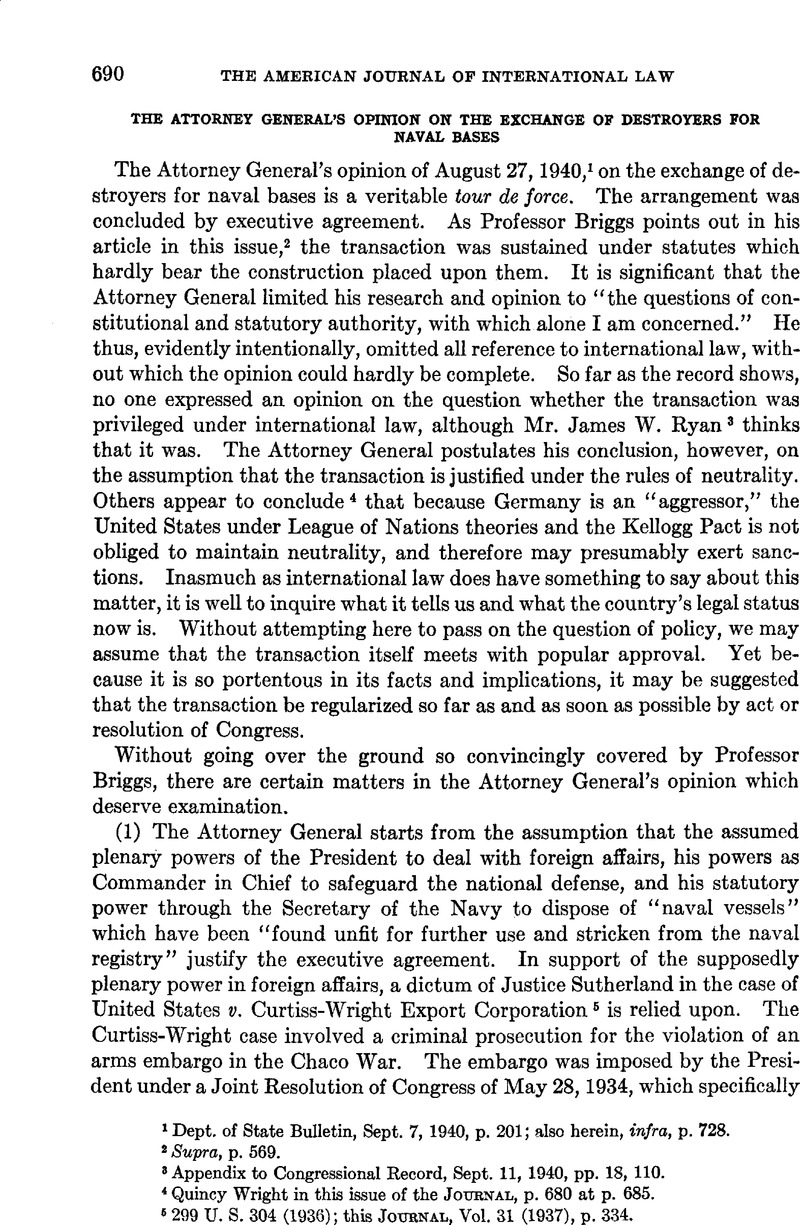Published online by Cambridge University Press: 12 April 2017

1 Dept. of State Bulletin, Sept. 7, 1940, p. 201; also herein, infra, p. 728.
2 Supra, p. 569.
3 Appendix to Congressional Record, Sept. 11, 1940, pp. 18, 110.
4 Quincy Wright in this issue of the Journal,p. 680 at p. 685.
5 299 U. S. 304 (1936); this Journal,Vol. 31 (1937), p. 334.
6 John Bassett Moore, “Treaties and Executive Agreements,” 20 Political Science Quarterly 385 (1905); James F. Barnett, “International Agreements without the Advice and Consent of the Senate,” 15 Yale L. Jour. 18, 63 (1905). Simpson, W. H., “Legal Aspects of the Executive Agreements,” 24 Iowa L. Rev. 67 (1938)Google Scholar.
7 On April 30, 1803, the two conventions were signed; on May 15, 1803, Great Britain declared war on France. Bemis, Diplomatic History of the United States, New York, 1936, pp. 135–136.
8 For. Rel., 1922, II, 595; Lansing Papers (Washington, 1940) II, 450; Griswold, Far Eastern Policy of the United States (1938), 216.
9 258 U. S. 198 (1922).
10 Professor Briggs has presented the background of the statute.
11 Professor Briggs gives the text of the certificate, supra, p. 574, note 21.
12 40 Stat. 217, 222.
13 John Bassett Moore has well said: “It is a self-evident proposition that if a government may by legislation fix the measure of what it owes to other states, there is no such thing as international law or international obligation.” Moore’s Arbitrations, I, 677.
14 On the whole subject, cf. Art. 5 of Harvard Research in International Law, Professor Jessup, Reporter, this Journal, Supplement, Vol. 33 (1939), pp. 235–245.
15 The circular of the Dept. of State, Oct. 15, 1914, reads: “For the Government of the United States itself to sell to a belligerent nation would be an unneutral act . . .” Deák and Jessup, Collection of Neutrality Laws (1939), p. 1256. See documents printed in Moore’s Digest, VII, 863-868; Woodrow Wilson (Jan. 1915) opposed the sale of government-owned Krag rifles “to any one during the progress of the present war,” and felt “it is really our duty (in the spirit, at any rate, of the Alabama decision) to prevent submarines being shipped from this countiy, even in parts.” R. S. Baker, Woodrow Wilson, V, 190–191.
16 In 1914, it was said by the British Embassy at Washington that “the Rules (of Washington) may be said to have acquired the force of generally recognized rules of international law.” American White Book, 1914, II, 37, quoted in Hyde, International Law, II, 713.
17 For the background of this article, see Research in International Law, supra, n. 14, pp. 249–256.
18 United States v. Pelly, 4 Commercial Cases 100.
19 “No State would dream of contesting the principle they (the Rules of Washington) contain.” Moore’s Arb., I, 674.
20 7 Wheat. 283; Moore’s Arb., I, 575.
21 “If that eminent jurist had said that a vessel of war was to be regarded in public law as an article which might be legitimately constructed, fitted out, armed, equipped, or dealt in by a person in the territory of a neutral, with the intent that it should enter the service of a belligerent, subject only to a liability to capture as contraband of war by the other belligerent, the United States would have been forced, with great regret, to ask this tribunal to disregard an opinion so at variance with common sense, and with the whole current of the action of nations.” Moore’s Dig., VII, 895.
22 Oppenheim sustains the sale of Hamburg American and North German Lloyd unarmed merchant vessels to Russia in the Russo-Japanese War because he considers them not to be auxiliary naval vessels. Were they to be so considered, their sale would be and has been subject to serious criticism, as Professor Briggs points out.
23 Vol. II, p. 711.
24 This Journal,supra, p. 685.
25 Harvard Research in International Law, this Journal, Supplement, Vol. 33 (1939), p. 821.
26 Cf. Bas o. Tïngy, 4 Dallas 37 (1800); Moore’s Digest, VII, 156.
27 Department of State Bulletin, Sept. 7, 1940, p. 201; this Journal,p. 569; Supp., p. 183.